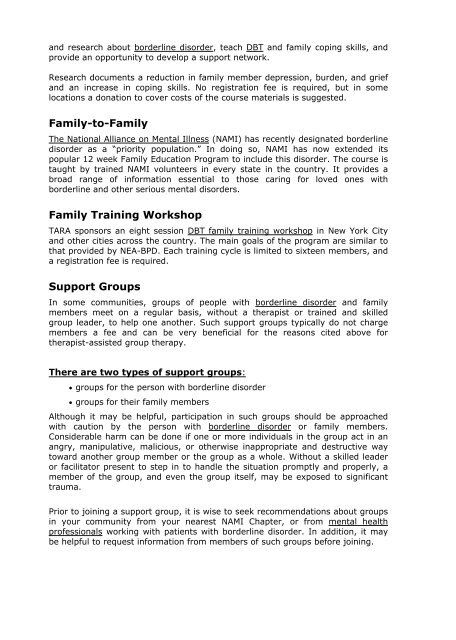personality disorders explained
Antisocial Personality Disorder, Codependence, Narcissism and Borderline
Antisocial Personality Disorder, Codependence, Narcissism and Borderline
Create successful ePaper yourself
Turn your PDF publications into a flip-book with our unique Google optimized e-Paper software.
and research about borderline disorder, teach DBT and family coping skills, and<br />
provide an opportunity to develop a support network.<br />
Research documents a reduction in family member depression, burden, and grief<br />
and an increase in coping skills. No registration fee is required, but in some<br />
locations a donation to cover costs of the course materials is suggested.<br />
Family-to-Family<br />
The National Alliance on Mental Illness (NAMI) has recently designated borderline<br />
disorder as a “priority population.” In doing so, NAMI has now extended its<br />
popular 12 week Family Education Program to include this disorder. The course is<br />
taught by trained NAMI volunteers in every state in the country. It provides a<br />
broad range of information essential to those caring for loved ones with<br />
borderline and other serious mental <strong>disorders</strong>.<br />
Family Training Workshop<br />
TARA sponsors an eight session DBT family training workshop in New York City<br />
and other cities across the country. The main goals of the program are similar to<br />
that provided by NEA-BPD. Each training cycle is limited to sixteen members, and<br />
a registration fee is required.<br />
Support Groups<br />
In some communities, groups of people with borderline disorder and family<br />
members meet on a regular basis, without a therapist or trained and skilled<br />
group leader, to help one another. Such support groups typically do not charge<br />
members a fee and can be very beneficial for the reasons cited above for<br />
therapist-assisted group therapy.<br />
There are two types of support groups:<br />
groups for the person with borderline disorder<br />
groups for their family members<br />
Although it may be helpful, participation in such groups should be approached<br />
with caution by the person with borderline disorder or family members.<br />
Considerable harm can be done if one or more individuals in the group act in an<br />
angry, manipulative, malicious, or otherwise inappropriate and destructive way<br />
toward another group member or the group as a whole. Without a skilled leader<br />
or facilitator present to step in to handle the situation promptly and properly, a<br />
member of the group, and even the group itself, may be exposed to significant<br />
trauma.<br />
Prior to joining a support group, it is wise to seek recommendations about groups<br />
in your community from your nearest NAMI Chapter, or from mental health<br />
professionals working with patients with borderline disorder. In addition, it may<br />
be helpful to request information from members of such groups before joining.

















